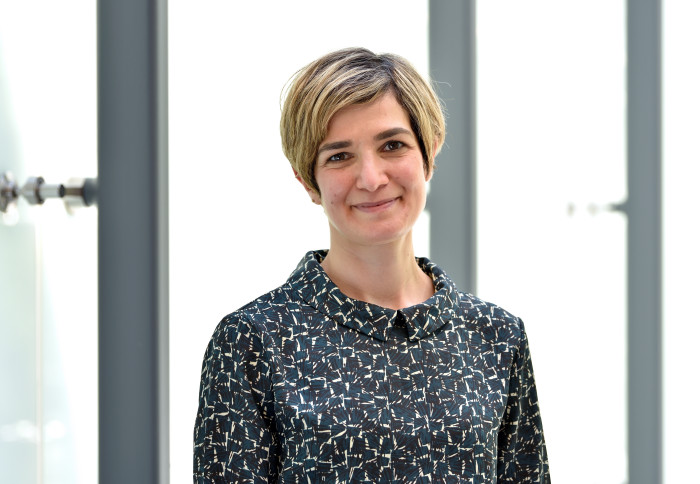Celebrating Aeronautics first female professor
by Ayesha Khan

Professor Zahra Sharif Khodaei
In the most recent academic promotions round, Zahra Sharif Khodaei is appointed as the first female Professor in the Department of Aeronautics.
Huge congratulations to Zahra Sharif Khodaei who has recently been awarded a professorship in becoming Aeronautic’s first female Professor.
Below we meet Zahra in marking this incredible personal achievement and milestone for the Department.
I obtained my PhD in Numerical Modelling of Functionally Graded Materials from Czech Technical University in 2008. Prior to my lectureship post in 2014, I was a Research Associate in the Department of Aeronautics where I conducted research into fatigue modelling and analysis of metallic and Fibre Metallic Laminates (FML), as well as development of technologies and methodologies for Structural Health Monitoring (SHM) of composite structures.
I am the Co-Founder of the Structural Integrity and Health Monitoring Group within the Department, a Fellow of the Royal Aeronautical Society and a Fellow of Women in Engineering Society.
Structural Health Monitoring
My research area of Structural Health Monitoring is an emerging field which is closely related to the developments of new smart structures – smartphones, smart cars, smart fridges etc. So the question is, why not smart aircraft?
SHM aims to integrate a large number of sensors over any given structure, and continuously monitors their response. As such we are able to detect any changes to the structure's integrity at a very early stage and in real time, with the ability to take action immediately - similar to our body’s nervous system.
This development will allow us to move away from the conservative design of composites, which are unable to detect small visible impact damages, which can be detrimental to the safety of the structure.
By relaxing the damage tolerant design of composite structures, we can make weight savings, resulting in less fuel consumption and greener aircrafts, as well as increasing safety via continuous monitoring.
Our research group is currently testing this technology on a five metre long curved fuselage panel (as part of the SHERLOC project) under complex loading. This technology can be used across many different applications.
I have also been awarded a research grant with the European Space Agency (ESA), which will look into reusability of vertical launchers where the application of SHM technologies can help with recertification of the structures.
Being part of Imperial enables me to conduct research with the right support. The College has state of the art facilities which allows me to carry out cutting edge research. More importantly, we have access to top students and staff who can help to facilitate all of this.
Proud to represent
I am very happy to be named as the first female professor in the history of the Aeronautics Department and very proud to represent a minority in a historically male-dominated field.
As an Iranian woman, I hope that I can inspire women, girls and those who do not have equal opportunities around the world. I’d like to dedicate this achievement to all of them. For such individuals we need to work together to empower change for the future.
This is a great milestone not just for me but for the Department as a whole. There has been a lot of great work in the past years related to Equality, Diversity, Culture, Communications and Inclusion from all different levels of staff.
We hope to see more balanced student and staff ratios in the future. We seek to achieve this by focusing on our outreach activities, as well as by having more visibility of our female role models in the aeronautics sectors to shift culture.
But, we are still far from having the equality, diversity and the inclusivity that we have all been working hard for. We still have no female academic representation in any Departmental leadership roles. If we want to change the culture and be more inclusive, we need to have diverse role models, who represent all in terms of growth and achievement in reaching new horizons. Such role models would also allow us to broaden perceptions of others and ourselves, as we work together to shatter unconscious limitations.
This will only be possible if we have the commitment from our male colleagues in leadership roles to help change the culture, see past gender and have a short and long term plans in place to promote career progression of women in the workplace. This is what I am hoping for and will be working towards.
Encouragement and support
For those seeking a path in academia, my advice would be - believe in yourself and ensure you have people around you who support you.
I have had an amazing mentor, Professor Ferri Aliabadi, who always encouraged me to think of the next steps in my research career and believed in me, which always motivated me to aim high. My family has encouraged and supported me throughout this journey, and I am so grateful to them for their unconditional support.
No two academics will have the same path in their career, so never compare yourself to others. There is no right or wrong path in academia; you need to find what works for you and at a pace that is right for you.
I would say it's important to share your stories, motivate and help each other, and above all champion equality and diversity wherever you go in your career.
Article text (excluding photos or graphics) © Imperial College London.
Photos and graphics subject to third party copyright used with permission or © Imperial College London.
Reporter
Ayesha Khan
Department of Aeronautics